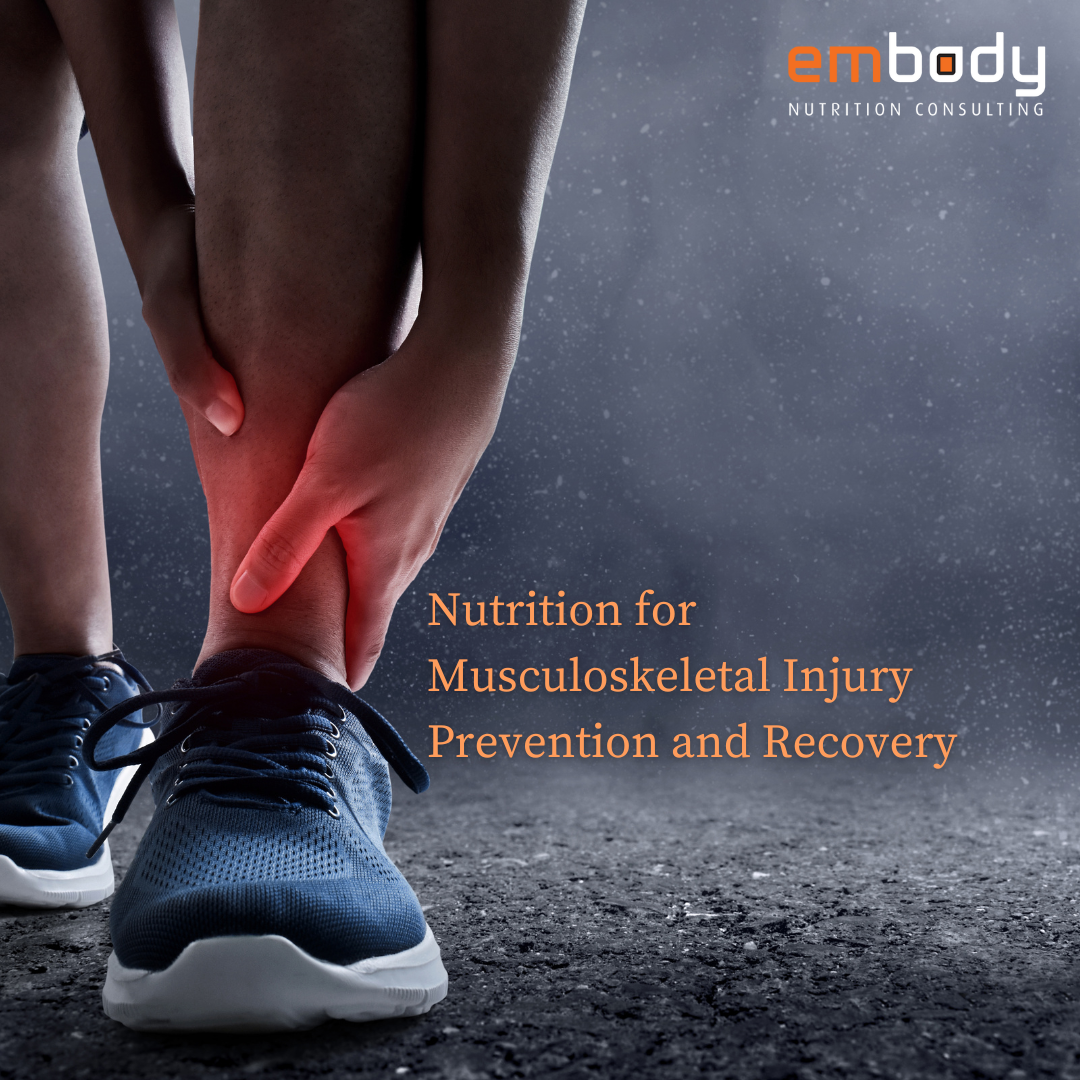Are you an injury prone athlete who is looking to utilise nutrition as an injury prevention tool? Or have you currently endured an injury and want to speed up your recovery time to get back out on the field, track or court faster? This article is just for you!
Nutrition plays a large role in both reducing the risk of sports related injury and promoting faster recovery from injuries. It can affect the way the body regulates across different systems, heals and responds to injury and stress. There are a range of nutritional considerations that can positively impact injury prevention and optimise recovery. These include adequate energy and protein intake, immune function, tissue repair and reducing inflammation.
Adequate Energy Intake
The human body requires energy from food to perform simple daily tasks such as walking, talking, going to work and exercising. However, consuming adequate calories is also crucial for injury prevention and recovery. It assists in maintaining muscle mass, preventing weight loss, supporting immune function and aiding in cellular maintenance and repair; all of which are at risk when you are injured.
Note: Individuals have varying energy requirements depending on genetic factors, activity levels, body composition and metabolism. Please reach out to a dietitian if you need assistance in understanding your energy requirements.
Adequate protein intake
Protein is a macronutrient found in various foods typically including: meat, fish, eggs, dairy products, nuts and seeds. It plays a crucial role in muscle growth, maintenance and repair. When looking to prevent and recover from injuries, consuming adequate protein through the diet is pivotal to reduce muscle loss and repair damaged tissue, for a faster recovery. After an injury protein intake can be increased (2-3g/kg/day) to aid the recovery process. For example if you are an athlete that weighs 75kg your daily protein requirements would be 150g-225g.
SUPPLEMENTATION
Omega 3’s
Omega 3’s can be found through the diet in fish, plant oils, nuts and seeds, however they are commonly supplemented in the form of tablets when requirements are increased or cannot be obtained through food. They play a large role in reducing inflammation, pain and muscle loss. This helps support the body’s healing process, reducing the risk of injury or promoting a faster recovery. DHA is a form of omega 3, usually found in fatty fish and plays an important role in muscle recovery. It is recommended that adults consume a minimum of 500mg of DHA and EPA (omega 3) combined per day. So, when looking to supplement omega 3, it is important you are opting for a product with at least 500mg of EPA and DHA combined.
Collagen
Collagen is the most abundant protein found in the body. It is the primary component of tendons, ligaments, skin and bones. It contributes to the structure, strength and function of these tissues. Collagen is made up of several amino acids, and ingestion of these increases collagen synthesis, contributing to joint health as well as enhancing ligament and tendon structure. Thus, resulting in stronger tissues, decreased injury risk and speeding up recovery time post injury. Studies suggest that 15-20g of collagen taken 40-60 minutes before training is sufficient and an effective strategy in treating and preventing tendon, ligament and joint injuries.
Creatine
Creatine is a compound that the body makes and is also found in small amounts of protein rich foods or in the form of a powder supplement. It is the most common supplement used by athletes to aid muscle growth, enhance performance and improve recovery.
Creatine is involved in the production of ATP; the body’s primary energy source during high intensity exercise. It assists in increasing the availability of this energy to the working muscles, leading to increased recovery between bursts of exercise and reduced fatigue. Research suggests that supplementing 5g of creatine daily for muscle recovery is sufficient, however after the event of an injury, increasing the dose (up to 20g per day) can be recommended during rehabilitation.
Vitamin D
Vitamin D is an essential nutrient that can be obtained via the diet if adequate quantities cannot be synthesised in the body as a result of sun exposure. Among many benefits including increased immunity and muscle function, vitamin D plays a profound role on bone health and bone formation after enduring a fracture. Vitamin D enhances the absorption of calcium which is another critical mineral for bone density and health. Without adequate levels of vitamin D, the body will find it difficult to absorb calcium, resulting in weakened bones and increased risk of injury. The recommended daily intake of vitamin D is 5μg (0- 50 years) and 10μg (51-70 years). The ideal level of vitamin D for athletes is 75- 120 nmol/L.
Note: If you are looking to purchase a vitamin D supplement, it is best to choose vitamin D3 as it is the most easily tolerated and is preferred for absorption.
The role of nutrition in injury prevention and recovery is often underestimated, but can have a profound impact on muscle, bone and tissue strength. Implementing these nutrition strategies will ensure your body is properly supported when performing at an elite level or recovering from an injury.

